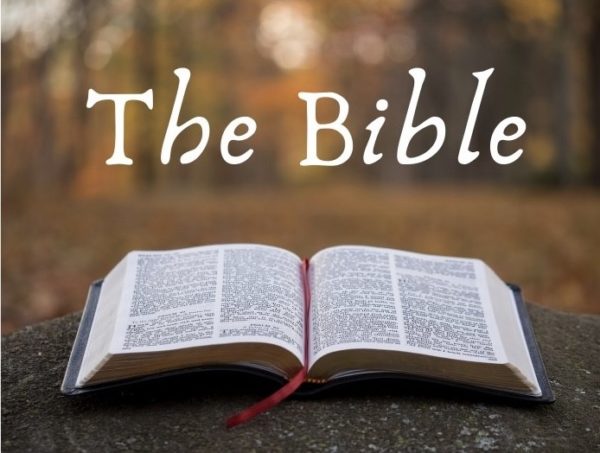Weekly Bible Devotional
“The Bible: The Prophetic Voice”
January 31, 2021
Scripture for Sunday: Isaiah 61:1-4, 8
1The spirit of the Lord God is upon me,
because the Lord has anointed me;
he has sent me to bring good news to the oppressed,
to bind up the brokenhearted,
to proclaim liberty to the captives,
and release to the prisoners;
2 to proclaim the year of the Lord’s favor,
and the day of vengeance of our God;
to comfort all who mourn;
3 to provide for those who mourn in Zion—
to give them a garland instead of ashes,
the oil of gladness instead of mourning,
the mantle of praise instead of a faint spirit.
They will be called oaks of righteousness,
the planting of the Lord, to display his glory.
4 They shall build up the ancient ruins,
they shall raise up the former devastations;
they shall repair the ruined cities,
the devastations of many generations.
8For I the Lord love justice,
I hate robbery and wrongdoing;
I will faithfully give them their recompense,
and I will make an everlasting covenant with them.
Notes on the Text:
This week’s scripture is about challenging perceptions of despair among the people of ancient Israel after their return from Exile. The prophet Isaiah was comforting and challenging his people at the same time. They had come back from Babylon after the Exile and instead of reforming their ways, they went right back to business as usual, with greed and violence as the norms of their society while limiting God to worship in the temple. Even the rebuilding of the temple did not seem to go very well for them. It looked so shabby compared to its old days of glory. The immediate occasion for Isaiah 61 was an economic crisis that was caused by the unethical financial dealings of the wealthy in that society who used their influence to grab land and money from others. They manipulated the application of tax and financial laws to get an unfair advantage over others. For example, during times of bad weather and drought, they would make loans at extremely high interest rates. When the poor borrower could not pay the entire amount back in one year, the next year the unpaid portion would be rolled over into a second loan which would double their interest rate. After a couple of years of this kind of interest rate hikes, the poor farmer would be left bankrupt and become a slave to the landowner. All of this was not only highly unethical but also against the teachings of the Hebrew faith as found in Leviticus and Deuteronomy about not charging interest.
With all of this going on, you would expect the prophet Isaiah to just give up and condemn the people of Israel as hopeless. But that is not what happens at all. In fact, the opposite was true. The prophet envisions a personal agent upon whom the spirit of the Lord rests, who is anointed, and who with the good news liberates. Even though the prophet names the pain and the injustices of his people, he does not give up on hope. He proclaims to them once again the vision of Jubilee. He lifts up before them an incredible vision of hope and justice. Even though their daily realities were nowhere near this vision of Jubilee, the prophet does not write them off as hopeless. He calls them again to greater faithfulness. He reminds them of the call to release debts, to free the oppressed, to release the land, and to practice economic justice in their daily life, justice that was based on God’s vision for all to have enough and to have their economic systems be set up in a way that allows for the poor to be released from their poverty.
We can dismiss the call of Isaiah to this kind of vision as idealistic and not based in reality. But the funny thing is this call which Isaiah had for the people of Israel was something Jesus came and proclaimed again. In the Gospel of Luke chapter 4 Jesus himself reads this scripture and proclaims it as his mission statement. He lifts it up as the call of his ministry and the vision of the kingdom of God which he was proclaiming.
For Reflection:
One of the great themes of scripture is the prophetic voice which always calls people to faithfulness to God. The prophetic voice is about shaping the world into God’s vision. The old saying, “Words create worlds,” is so true of this theme. With their ability to connect deeply with God and to see reality through God’s vision, prophets in the biblical tradition call people back to God’s vision. In times of prosperity, they reminded their people of justice, letting go of greed, and taking care of the vulnerable in society. In times of despair, they reminded people of hope. In times of fear, they reminded people of faith and of God’s steadfast love. Their words shaped the vision of people who listened.
When we lose our way through the illusions of power, control, security, and egotistical esteem, the voice of the prophets can lead us back to what truly gives us peace, joy, and fulfilment in life. The popular consciousness of the world often misleads us to believe that fear, exploitation, hate, and violence are the norms of the world. The prophetic voice calls us to live by God’s values of inclusive and ever-expanding love, sharing, and care. Yet, the prophetic voice is not always easy to hear because it often challenges our dominant perceptions that seem so true to us.
During this time of cynicism and fear in our world today, the prophetic voice of hope and challenge gives us a vision of what is possible for us in the future. As human beings, we often forget that we are made in the image of God. We are called to listen to the voices of the prophets in the past and the present so that we may live into God’s future where vision of the world is not based on what is popular or accepted by society, but on the love of God and of neighbor. If we allow the prophetic voices of the past to shape us into the people of God, our present and future lives will be shaped by words that create new worlds of love and justice.
Prayer by Walter Brueggemann:
You are a God who awes us and astonishes us.
You are a God who selects a dysfunctional family to carry your future.
You are a God who dwells with barren women who become mothers in Israel.
You are a God who makes promises with no evidence at hand or in sight.
You are a God powerful in purpose, hidden in performance, faithful over time.
And we are among those drawn into the orbit of your life;
A life teeming with impossibilities so hard to trust, so impossible to explain, so precious to treasure.
Give us this day the freedom to be amazed and to trust your way among us,
Even when the world seems closed to all futures.
We praise you, future-creating God. Amen.
“Keep Me in Touch with My Dreams” Prayer by Ted Loder:
O Lord,
in the turbulence
and the loneliness
of my living from day to day
and night to night,
keep me in touch with my roots,
so I will remember where I came from
and with whom;
keep me in touch with my feelings,
so I will be more aware of who I really am
and what it costs;
keep me in touch with my mind
so I will know who I am not
and what it means;
and keep me in touch with my dreams,
so I will grow toward where I want to go
and for whom.
O Lord,
deliver me
from the arrogance of assuming
I know enough to judge others;
deliver me
from the timidity of presuming
I don’t know enough to help others;
deliver me
from the illusion of claiming I have changed enough
when I have only risked little,
that, so liberated,
I will make some of the days to come different.
O Lord,
I ask not to be delivered
from the tensions that wind me tight,
but I do ask for a sense of direction in which to move once wound,
a sense of humor about my disappointments
a sense of respect for the elegant puzzlement of being human,
and a sense of gladness for your kingdom
which comes in spite of my fretful pulling and tugging.
O Lord,
nurture in me
the song of a lover,
the vision of a poet,
the questions of a child,
the boldness of a prophet,
the courage of a disciple.
O Lord,
it is said you created people
because you love stories.
Be with me as I live out my story. Amen.


